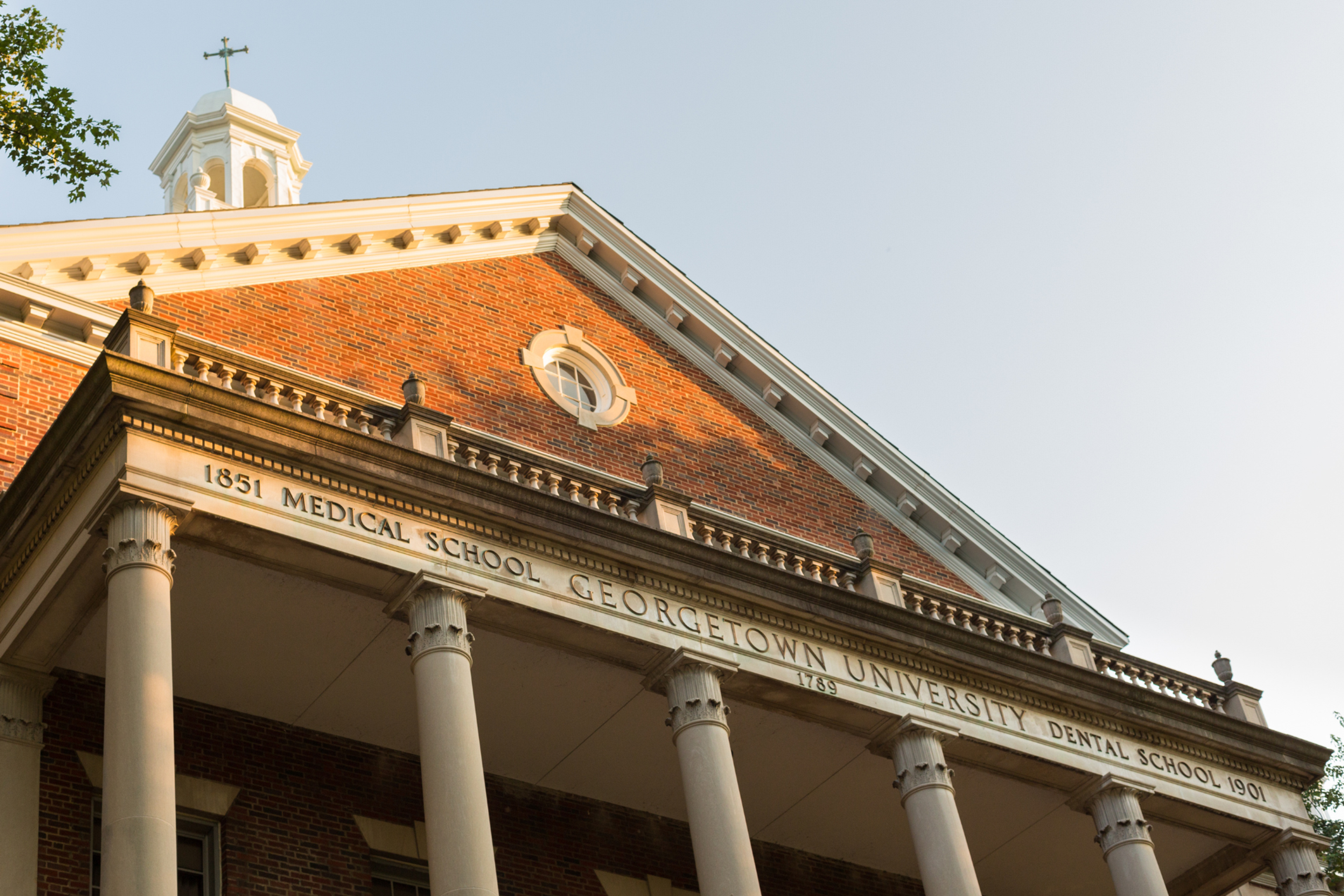Georgetown Medical School Acceptance Rate: Breakdown & Analysis (2025)
Learn Georgetown Medical School’s 2025 acceptance rate, GPA/MCAT stats, and how to strengthen your application for this competitive program.
Posted July 8, 2025

Join a free event
Learn from top coaches and industry experts in live, interactive sessions you can join for free.
Table of Contents
Earning a spot at Georgetown University School of Medicine (GUSOM) is a dream for many determined pre-med students, and understanding Georgetown’s acceptance rate is a crucial first step. As one of the nation's most respected Jesuit medical schools, Georgetown draws thousands of applicants each year who are not only academically strong but also mission-driven, service-minded, and eager to impact health care at the highest levels.
The admissions process at GUSOM is competitive, balancing academic metrics like GPA and MCAT scores with deeper elements like personal mission, clinical experience, and commitment to Georgetown’s values of cura personalis (care for the whole person). For serious applicants, getting a realistic picture of the numbers, and what successful candidates tend to bring to the table, is essential.
This guide breaks down everything you need to know: Georgetown’s acceptance rate, how in-state vs. out-of-state admissions trends compare, key stats like average GPA and MCAT scores, and actionable strategies for strengthening your application. We’ll also walk you through the interview process, important deadlines, and specific tips on standing out.
If Georgetown is on your list, this is the roadmap you’ll want to follow to maximize your chances, and build an application worthy of becoming part of the GUSOM community.
What Is Georgetown Medical School’s Acceptance Rate in 2025?
Georgetown University School of Medicine remains one of the most competitive medical schools in the United States. For the class of 2028, GUSOM received approximately 14,480 applications and matriculated 203 students, resulting in an acceptance rate of 2.89% .
Georgetown Medical School Class Profile
Understanding the class profile at GUSOM gives you a real sense of how competitive the applicant pool is, and what you should aim for to stay competitive.
Here’s a snapshot based on the most recent data:
- Average Overall GPA: 3.76
- Average MCAT Score: 513
- Class Size: 203 matriculants
- Female: 135
- Male: 67
- Non-Binary: 1
- URIM: 31
Numbers alone won’t get you in, but falling significantly below these benchmarks makes it much tougher. Aim to be close to or above these averages, especially in science coursework, where rigor and performance matter most.
Read: Medical School Acceptance Rates, GPA, and MCAT Scores of the Top 15 Programs
What Factors Influence Admission at Georgetown Medical School?
Georgetown uses a holistic review process, meaning they look beyond the numbers to evaluate your full potential as a future physician. Here's what carries real weight:
Academic Performance
Your academic track record still matters -- a lot. Georgetown wants students who can handle the demands of medical school from day one.
What they focus on:
- Strong science coursework: Biology, chemistry, physics, biochemistry, and math performance.
- Upward trends: If you struggled early on but improved, that’s seen positively.
- Course rigor: Challenging yourself with upper-level science classes helps show readiness.
An occasional “B” won’t break you, but weak grades in science prerequisites without an upward trend can. Always be ready to explain academic dips honestly but tactically in your secondary essays if needed.
What Test Scores Are Needed for Admission to Georgetown Medical School?
MCAT performance is a major gatekeeper.
Here’s the breakdown:
- Median MCAT: 513
- Typical Range: 509–516
Section Scores Matter Too: GUSOM looks for balance, and not a single sky-high score offsetting weak sections. Ideally, each MCAT section (Chem/Phys, CARS, Bio/Biochem, Psych/Soc) should land within a few points of each other.
Expert Tip: If your MCAT score is a little below the median (say, 508–509), a very strong GPA, service record, or mission fit can still keep you competitive, but you’ll want to mitigate the risk with exceptional application essays and recommendations.
Essays and Recommendations
At Georgetown, your secondary essays and letters of recommendation can be deal-makers or deal-breakers.
Essays: GUSOM’s secondary prompts are mission-driven. They want to see that you resonate with values like service, leadership, and cura personalis (care for the whole person).
Strong essays do three things:
- Tell a clear, personal story of why you belong in medicine.
- Connect your experiences to Georgetown’s mission.
- Show personal growth, resilience, and emotional intelligence.
Letters of Recommendation: Georgetown typically expects:
- Two science faculty letters
- One non-science faculty letter
- Additional letters from clinical, research, or service supervisors (optional but encouraged)
Application Process and Deadlines
Applying to Georgetown University School of Medicine (GUSOM) is a multi-step journey, and managing the timeline strategically is a key part of making yourself competitive. Here's exactly what you need to know:
Step 1: Submit the AMCAS Primary Application
- Opening Date: Early May 2024
- Submission Date: Late May/Early June 2024 (when AMCAS opens for submission)
Submit your AMCAS as early as possible, even if Georgetown has a rolling admissions process, early applicants have a stronger chance of being reviewed before the class fills up.
Step 2: Georgetown Secondary Application
- Secondary Sent: Typically within 1–2 weeks after AMCAS verification.
- Secondary Deadline: December 15, 2024
Step 3: Screening for Interviews
Georgetown screens applicants before offering interviews.Factors that influence whether you move forward:
- Overall and science GPA
- MCAT score
- Clinical experience and service record
- Mission alignment shown through essays
No automatic cutoffs, but falling significantly below their average MCAT (512) or GPA (3.7) makes getting an interview much harder.
Step 4: Interviews (By Invitation Only)
- Interview Season: August 2024 – March 2025
- Format: Traditional 1-on-1 interviews (no MMI) -- usually 2–3 interviews total.
Prepare for a mix of behavioral, ethical, and mission-fit questions. Georgetown values reflection, resilience, and service-mindedness, not just academic achievement.
Step 5: Final Decisions
- Rolling Admissions: Georgetown issues decisions on a rolling basis after interviews, continuing until the class is filled.
Expert tip: Early interview = earlier decision = better odds. Delays in application = higher risk of only waitlist spots being available.
Georgetown Medical School Deadlines to Remember
| Milestone | Date (Approximate) |
|---|---|
| AMCAS Application Opens | May 1, 2024 |
| AMCAS Submission Begins | May 28, 2024 |
| Georgetown Secondary Opens | Early June 2024 |
| Secondary Application Deadline | December 15, 2024 |
| Interviews Begin | August 2024 |
| Interviews End | March 2025 |
| AMCAS Choose Your Medical School Tool Opens | February 2025 |
| Final Decision Deadline (Commit to Enroll) | April 30, 2025 |
Read:
- Medical School Requirements: What You Need to Get In
- Medical School Post-Interview Acceptance Rate Overview
Required Materials
To apply to Georgetown University School of Medicine, you’ll need to prepare and submit the following materials, and every piece matters:
1. Primary AMCAS Application
Submit through the AMCAS system, including personal statement, activities, and MCAT scores. Georgetown screens all applicants before sending secondaries, so a strong AMCAS is crucial.
2. Secondary Application
Georgetown’s secondary questions focus heavily on mission fit, service, leadership, and resilience.
- Tip: Secondary turnaround speed matters; aim to submit within 2 weeks of receiving it.
3. Official MCAT Scores
GUSOM accepts MCAT scores up to three years old, but competitive applicants generally apply with recent, strong scores.
4. Official Transcripts
Must be sent to AMCAS from every institution you’ve attended.
5. CASPer Test (Situational Judgment Test)
Required as part of the Altus Suite. CASPer evaluates traits like ethics, professionalism, and interpersonal judgment, skills that Georgetown values highly.
6. Interview (By Invitation Only)
If selected, you’ll complete a traditional one-on-one interview format, no MMI. Be ready to discuss your motivations, values, and how you embody cura personalis.
Strategies to Improve Your Chances of Admission to Georgetown Medical School
Getting into Georgetown isn’t just about checking boxes. It’s about telling a full story that shows you belong in a mission-driven, service-centered medical environment.
Here’s how to actually move the needle on your application:
1. Show Mission Alignment, Not Just Passion for Medicine
Georgetown is deeply rooted in Jesuit traditions like cura personalis and service to underserved communities.
In essays and interviews, connect your experiences to those values explicitly. Don't just say you love medicine, but you have to show how you care for people holistically.
2. Prioritize Service Over Flashy Activities
A long list of research publications looks impressive, but a consistent, deep commitment to community service resonates even more at Georgetown.
Highlight experiences working with vulnerable populations, health equity efforts, tutoring, mentoring, or nonprofit volunteering.
3. Be Ready to Discuss Academic and Personal Growth Honestly
Georgetown’s admissions committee respects resilience and reflection. They don’t expect perfection.
If there’s a dip in grades, a late start in clinical exposure, or a gap year, frame it as a story of learning, adjustment, and growth, not a weakness.
4. Crush the CASPer Test
The CASPer is not a throwaway.
Practice situational judgment scenarios beforehand. Treat each prompt like you're already a medical student making professional decisions. Practice thinking fast, ethically, and clearly.
5. Be Strategic About Your Letters
Strong letters add human depth to your numbers.
Coach your recommenders. Remind them to mention qualities like leadership, maturity, ethical reasoning, communication skills, and patient-centered thinking, not just your academic performance.
6. Prepare for Behavioral and Mission-Focused Interview Questions
Georgetown’s interviewers often ask about:
- Moments when you demonstrated compassion
- Times you failed and grew from it
- How you’ll embody cura personalis as a physician
Build 3-5 strong, detailed stories you can adapt across interview questions with clear reflections and takeaways showing growth and mission fit.
Bottom Line
Getting into Georgetown University School of Medicine isn’t easy, and it’s not supposed to be. GUSOM looks for future physicians who are not only academically strong but also deeply committed to service, leadership, and patient-centered care. If you're serious about joining this community, every part of your application, from your GPA and MCAT to your essays, recommendations, and clinical experiences, must reflect both intellectual strength and personal mission. Georgetown values applicants who know themselves, who show resilience, and who have already begun living the ideals of cura personalis before stepping onto campus. But with strategic preparation, authentic storytelling, and the right mindset, you can absolutely compete! Build your application with intention, stay ahead of deadlines, and let your passion for medicine and service shine through. Every step you take now is a step toward the physician and the person, you’re working to become.
Get Into the Medical School of Your Dreams with the Help of an Expert
Whether you’re planning to apply to Georgetown Medical School or another program, you don’t have to go through the entire process alone. We have experts who are here to help guide you on this big step toward working in the medical field.
Working with a medical school admissions coach will help you prepare for every step of the medical school application process and target the programs best suited for you and your career goals.
Read these next:
- MD Application Deadlines of the Top 50 Medical Schools
- Medical School Application Timeline: The Ultimate Guide
- Medical School Cost Breakdown: How Much Does It Actually Cost?
- Medical School Requirements: What You Need to Get In
FAQs
Is Georgetown Med School hard to get into?
- Yes, very. Georgetown’s acceptance rate for the 2025 cycle was around 1.25%, making it one of the most selective programs in the country. Applicants must show outstanding academics, strong service records, and a clear fit with the Georgetown community. Receiving a secondary application invitation is competitive, and moving to the Georgetown medical school interviews phase requires a holistic, standout profile.
What GPA do you need to get into Georgetown Medical School?
- You should aim for an overall GPA around 3.7 or higher to be a competitive applicant. A strong organic chemistry and science GPA is especially important. Georgetown values upward academic trends too, so late improvements in tough courses can still position you well.
What is the MCAT score for Georgetown Med?
- The median MCAT score for recently admitted students is around 512. Successful applicants typically show consistency across sections, not just one high score. Georgetown wants students ready for the demands of the advanced clinical phase of training, so strong foundational knowledge matters.
Is Georgetown Medical School prestigious?
- Absolutely. Georgetown consistently ranks among top-tier medical schools in various medical school rankings, particularly for its emphasis on training compassionate physicians grounded in ethics, service, and patient-centered care. It's highly respected nationwide for producing both excellent clinicians and future leaders in medicine.
Does Georgetown favor in-state, out-of-state, or international applicants?
- Georgetown is a private Jesuit institution, so there is no preference for in-state applicants. They welcome students from across the U.S. and internationally. International students are encouraged to apply but should be aware that access to financial aid is much more limited for non-U.S. citizens.
Browse hundreds of expert coaches
Leland coaches have helped thousands of people achieve their goals. A dedicated mentor can make all the difference.


















